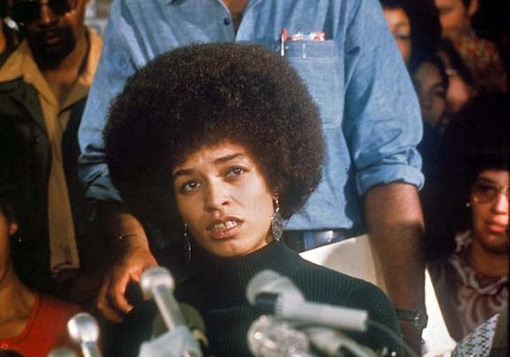“The Black Power Mixtape: 1967-1975” plays on PBS’s “Independent Lens” Thursday, February 9, 2012. Check local listings. It is also available on DVD, Netflix Instant and Amazon Instant.
After viewing “The Black Power Mixtape: 1967-1975,” I stumbled out of the theater and into a blinding, mid-afternoon New York City sun, every nerve in my body ablaze. All my neurons seemed to be firing at once, and my brain was so full of thought I sought some way to collect myself. I started to walk, focusing more on reconciling my thoughts than a navigational direction. With no destination in mind, I walked for what seemed an eternity, trying to put my emotional responses together. I was jolted from my mental process by an old woman standing next to me on a Manhattan street corner. I must have looked shell-shocked, because she touched my arm as we waited for a Lower East Side traffic light to change. “Honey, are you alright?” she asked, genuine concern on her face.
Fully back in reality, I said “I’m fine, ma’am. Thank you for asking.”

My reaction requires an explanation. Swedish journalist and filmmaker Göran Hugo Olsson‘s documentary took me back to the days when I came to a mature understanding of the implications of being Black, male, and broke. My adolescence was full of reading the speeches and works of Black leaders besides Dr. Martin Luther King, Jr. I chose to do this after my uncle took me to a Black-owned bookstore and suggested several books I should read. He avoided MLK not out of some form of militant stance, but because footage and information about King were everywhere. He was the star of every Black History Month on TV, and those who rejected the message of non-violence were either marginalized, demonized or ignored. I devoured works by people whose messages were downright terrifying to mainstream America: Malcolm X, Stokely Carmichael, Eldridge Cleaver, and Huey P. Newton.

Olsson culls footage from Swedish news of these and other players in the Black Power movement and assembles it in chronological order from 1967-1975. Some of this footage hasn’t been seen in 30 years, and never on American TV. Commentary is provided on the soundtrack by musicians like Talib Kweli, observers of the Black Power movement, and even the documentary subjects themselves. “The Black Power Mixtape” is invaluable supplemental material to all my reading of “radical” Black thought, providing a visual context I sorely lacked. On an emotional level, this film was also an Afro pick to my nappy soul, with each pop bringing forth flashbacks of the genesis of my own racial identity.


The Black Power Movement is polarizing, and in the current climate of the marketing tool known as “post-racial America,” it probably seems downright hostile. But “Mixtape” is quick to point out that Martin Luther King was equally polarizing during the Civil Rights Movement. One commentator refers to “the Santafication of Dr. King,” which disposes of just how controversial he was in favor of some warm, cozy legendary figure. “Mixtape” shows how low King’s favorability rating in the 60’s was for many Whites and even some Blacks. King was called a socialist, a communist, and a threat to both states’ rights and the American way of life. There were even doctored pictures that took King’s familiar mustache and shaved it into an even more familiar mustache, that of Hitler.
Questlove, drummer for the Roots and one of the few people whose hairstyle immediately evokes the period “Mixtape” covers, provides a powerful commentary on King, using an M-word I doubt many people would consider to describe the Civil Rights hero:
“Martin Luther King had a change of heart. He was starting to take a militant, stronger position. And his new battle was ‘no war.’ The government said ‘whoa! Whoa! He’s starting to come into our territory. It’s one thing to let you take a shit in the same toilet I do, but you ain’t gonna stop my money flow. Uh-unh. You gotta go!”

Harry Belafonte’s commentary on King concludes with the same message: “He had to go.” A lot of people “had to go” in the 1960’s — JFK, Robert Kennedy, Medgar Evers, Malcolm X, Martin Luther King — and the pattern is not lost on the disenfranchised. In the movie’s 1968 segment, a journalist asks a young Black man if he feels the situation for Black Americans is hopeless. Both he, and the bespectacled young Black woman standing next to him, express that everyone who tries to help the impoverished, the downtrodden and the “cullud” winds up dead. “I think it is hopeless,” says the young man with chilling resignation. One could easily understand why a denizen of this era would exchange King’s nonviolent agenda for a blatant, defensive one.

Director Olsson states: “I am not trying to tell the story about the Black Power movement. I’m telling the story of how it was perceived in Sweden. So it’s an outsider’s look, from outsiders’ material.” This “outsider’s look” lends the documentary its power. The interviewers aren’t asking these questions to be snarky or funny, but simply because they don’t know the whys of a situation. Being foreigners, the journalists in “The Black Power Mixtape” lack an opinion on what they are documenting. Their footage is presented without agenda, with an unfiltered gaze the American media would never have allowed. This is a fact-finding mission, and the most naïve questions yield the most powerful, educational answers. One such question for Angela Davis in the 1973 segment causes the most famous female in the movement to react with a clearly stated, controlled fury that shakes the screen.

Other clips show figures of the movement as ordinary people, not just fiery speechmakers, humanizing them in an identifiable way regardless of one’s opinion on the subject. Commentator Kweli is affected by scenes of Stokely Carmichael sitting around joking with people, noting that he’d never seen a clip that wasn’t some form of a public speaking event. “He was just a regular dude,” Kweli says. Like Davis, Carmichael takes over the film in one segment. Sensing that the female interviewer is having difficulty asking the right questions to his mother, Mable, Carmichael asks, “would you like me to do the interview?” The interviewer agrees, and Carmichael asks questions about his father’s carpentry job. He wants to know the real reason his father had to take multiple jobs while his White counterparts could get by with just the same job his father held. Gently but firmly, Carmichael coaxes his mother to reveal the answer he desires. We know what she wants to say, but Mrs. Carmichael feels she must be less explicit and more diplomatic. After much prodding, Carmichael gets his answer: “Because he was colored,” says his mother. “Thank you,” says Carmichael.

The back and forth between Mrs. Carmichael and her son highlights the generational gap between those who followed King and those who became involved with the Black Panther Party and other aspects of the Black Power Movement. They saw King as their Mama’s leader, and though figures like Carmichael and Black Panther Minister of Information Eldridge Cleaver acknowledged the work King had done, they found his methodology outdated. The general consensus was: “We’re younger, so action can be taken by us.”

On the soundtrack, recorded in 2009 and 2010, several people provide opinions on, and explanations of, the time-capsuled footage. Robin Kelly credits the Black Power Movement as one of the inspirations for the second wave feminist movement, the gay liberation movement and hip hop. Black Panther co-founder Bobby Seale discusses his intentions for the party he created. A drug counselor talks about how drugs infected the communities and slowed progress to a crawl. Former Fugees member John Forté speaks of how inspired he was by the words and books of Black Power Movement members like Angela Davis while in jail. Angela Davis speaks of her own time incarcerated as well.

I’ve seen “The Black Power Mixtape: 1967-1975” twice, and while I was profoundly affected, your mileage may vary. I think it is a companion piece to all that we know about Dr. King’s legacy. People like Malcolm X and Huey P. Newton are yin to King’s yang, and both they and King are useful and effective means of leading us through the Civil Rights period. To discount one over the other would be disingenuous, as they are equally intertwined. In today’s political universe, there are too many attempts to whitewash elements of history, elements that might explain why a Black person would choose a gun over Gandhi in 1967. This documentary is a welcome reminder of the landscape my parents’ generation saw.

One scene in “Mixtape” sums up nicely where the power truly is. Lewis H. Michaux, the owner of a Harlem bookstore not unlike the one my uncle took me to, tells a story to the journalists about schooling a young Black man who came into his store speaking of “Black Power” and throwing up the salute. Michaux says:
“I told that young man ‘Black is beautiful but Black is not power. Knowledge is power. You can be Black as a crow, or as White as snow, but if you don’t know and ain’t got no dough, you can’t go. And that’s for sho’!”
Amen, Brother. Amen.




_ _ _ _ _

A globetrotting computer programmer by trade and movie lover by hobby, Odie Henderson has contributed to Slant Magazine’s The House Next Door since 2006. Additionally, his work has appeared at Movies Without Pity (2008) and numerous other sites. He currently runs the blog Tales of Odienary Madness and is the troublemaker behind the Black History Mumf series at Big Media Vandalism.












